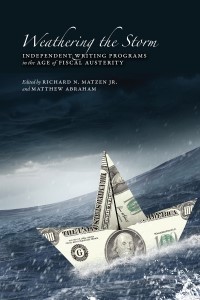Dr. Rich Matzen on the Economic Staying Power of Professional Writing Programs
 When times are tough, a natural reflex is to retrench, to pull back, and –- in the case of the Great Recession — to stand by and watch funding levels for (fill-in-the-blank) programs shrink.
When times are tough, a natural reflex is to retrench, to pull back, and –- in the case of the Great Recession — to stand by and watch funding levels for (fill-in-the-blank) programs shrink.
But not always, or at least not predictably. Richard N. Matzen, Jr., Ph.D., professor of the Writing Department at Woodbury University, has just co-edited a new book with Matthew Abraham, Weathering the Storm: Independent Writing Programs in the Age of Fiscal Austerity (published by Utah State University Press, 2019), that illuminates the distinct role that independent writing programs (IWPs) and independent writing departments (IWDs) have played, and continue to play, in higher education –- in good times and bad.
The book’s major takeaway is nuanced and even heartening. Says Dr. Matzen: “While jobs can be cut during difficult economic times, which happened to some IWPs/IWDs during the Great Recession, difficult economic times can mean that IWPs/IWDs expand their jobs and curriculum.”
“Said another way, as families become financially stressed, their children or potential students become more concerned that their university enrollment and graduation leads to jobs,” he explains. “Writing programs, subsequently, review their (professional) writing curriculum during difficult financial times so that the curriculum is more closely aligned with employment after graduation.”
Weathering the Storm presents 13 case studies that represent small, medium, and large universities and their IWPs/IWDs. On average, each has existed for 25 years. “One creation myth about an IWP or IWD is that such is only created by separating from a traditional English Department,” he says. “However, some IWPs and IWDs are and were created without coming from an English Department. This makes the definition of an IWP/IWD even more complex than it already is.”
While he notes that the Great Recession did indeed cause state governments to reduce their funding for colleges and universities, those cutbacks “did not always filter down to IWPs/IWDs. One reason is because first-year writing courses were (or are) deemed indispensable to colleges’ and universities’ missions, which among other things, includes graduating employable students.”
Indeed, budget cuts actually helped some IWPs/IWDs. “Because of funding cuts, universities sought new revenue streams in the form of offering more marketable undergraduate degrees,” Dr. Matzen says. “Because professional writing or writing degrees were considered more marketable compared to other degrees in the humanities, writing majors and/or minors were added to curriculum during or immediately after the Great Recession.”
“On the one hand, our book suggests that, when a university suffers a period of fiscal austerity such as the Great Recession, this does not necessarily lead to that university’s IWP/IWD suffering the same fate,” he observes. “Some IWPs/IWDs actually grew during this period. On the other hand, other IWPs/IWDs, like the university, experience short-term losses that can be turned into long-term gains through curricular adjustments.”
Among those adjustments: writing specialists and writing program administrators adjust (professional) writing curricula, majors and minors, to enhance a degree’s marketability. Likewise, writing centers, programs, and curricula become more infused with interdisciplinary relationships.
“The gestalt of the book is that each IWP/IWD does not stand still over time but instead continually innovates programs or reinvents itself,” Dr. Matzen says. “We make the argument that an underappreciated interdisciplinary quality of writing studies makes innovation and invention even more likely.”